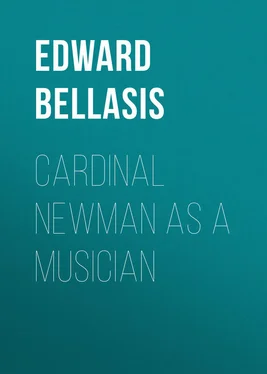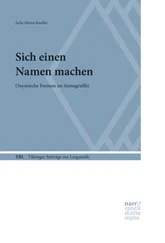Edward Bellasis - Cardinal Newman as a Musician
Здесь есть возможность читать онлайн «Edward Bellasis - Cardinal Newman as a Musician» — ознакомительный отрывок электронной книги совершенно бесплатно, а после прочтения отрывка купить полную версию. В некоторых случаях можно слушать аудио, скачать через торрент в формате fb2 и присутствует краткое содержание. ISBN: , Жанр: foreign_antique, foreign_prose, на английском языке. Описание произведения, (предисловие) а так же отзывы посетителей доступны на портале библиотеки ЛибКат.
- Название:Cardinal Newman as a Musician
- Автор:
- Жанр:
- Год:неизвестен
- ISBN:http://www.gutenberg.org/ebooks/26427
- Рейтинг книги:5 / 5. Голосов: 1
-
Избранное:Добавить в избранное
- Отзывы:
-
Ваша оценка:
- 100
- 1
- 2
- 3
- 4
- 5
Cardinal Newman as a Musician: краткое содержание, описание и аннотация
Предлагаем к чтению аннотацию, описание, краткое содержание или предисловие (зависит от того, что написал сам автор книги «Cardinal Newman as a Musician»). Если вы не нашли необходимую информацию о книге — напишите в комментариях, мы постараемся отыскать её.
Cardinal Newman as a Musician — читать онлайн ознакомительный отрывок
Ниже представлен текст книги, разбитый по страницам. Система сохранения места последней прочитанной страницы, позволяет с удобством читать онлайн бесплатно книгу «Cardinal Newman as a Musician», без необходимости каждый раз заново искать на чём Вы остановились. Поставьте закладку, и сможете в любой момент перейти на страницу, на которой закончили чтение.
Интервал:
Закладка:
He writes to his sister, October, 1834: "There is a lady here" (at Tunbridge Wells), "who plays most beautifully. I think I never heard such a touch – why, I cannot make out, for she has not long fingers to be brilliant. So you must set yourself to rival her. It would be interesting to examine the causes of expression, which you might easily do. Strength of finger is one thing certainly. This lady is not brilliant in the common sense – that is, smart and rattling – but every note is so full-toned, so perfect, that one requires nothing beyond itself. This in Beethoven's effective passages produces a surprising effect. I accompanied her last night and am to do so again to-night." 25 25 Mozley, Corr. ii. 67.
He wrote in September, 1865, of a certain boy's progress with the violin: "He plays fluently, so to say; by fluency I mean in time, in tune, and with execution. This is stage one; stage two is eloquence, by which I mean grace, delicacy, and expression. To gain this nothing is better than to accompany his sisters. A boy who always is first fiddle is in danger of artistic faults parallel to those which are implied in the metaphorical sense of the words. When he comes back I think he has had enough of the music-master, and I shall try to make him turn his thoughts to a higher school of music than is suitable to a beginner, but I cannot tell whether he is old enough to take to it. I recollect how slow I was as a boy to like the school of music which afterwards so possessed me that I have to come to think Haydn, in spite of his genius, almost vulgar." And just as Blanco White would seem to have thoroughly initiated Mr. Newman into the mysteries of Beethoven, so did Dr. Newman lead on his boys (as they would say) "to swear by" that master. They might start with Corelli, and go on to Romberg, Haydn, and Mozart: their ultimate goal was Beethoven, and round would come the "Father Superior" with ancient copies of the quintet version of the celebrated septet, and arrangements from the symphonies; nor were the first ten quartets, the instrumental trios, the violin sonatas, and the overtures forgotten. The "Dutchman," with his force and depth, his tenderness and sweetness, was the Cardinal's prime favourite. "We were at the concert," Mrs. Newman writes to him at school, "and fascinated with the Dutchman" (the name he had given to Beethoven to tease his music-master because of the van to his name), "and thought of you and your musical party frequently." 26 26 Mozley, Corr. i. 19.
"They tell me," he said in May, 1876, on occasion of hearing at the Latin Play, the scherzo and finale of the Second Symphony, "that these first two symphonies of Beethoven are not in his style; to me they are Beethoven all over. There is no mistaking that scherzo ." And again in October, 1877, after a rendering of the allegretto of the Eighth Symphony, on our observing that it was like the giant at play, he said: "It is curious you should say that. I used to call him the gigantic nightingale. He is like a great bird singing. My sister remembers my using the expression long ago." And although he betrayed a little doubt as to Beethoven's tone being essentially religious, he was unwilling to hear anything said against him. 27 27 The late Canon Mozley said that Chopin was "certainly a Manichean; he did not believe in God; he believed in some spirit, not in God;" while "the moral grandeur of Beethoven's genius was always present to him, as, with less force, was also Mendelssohn's: 'They believed in God – their music showed it.'" ( Letters , p. 353, Edit. 1885.)
The late Father Caswall, once distracted, while singing High Mass, with Beethoven's Mass in C, half-humorously vented his wrath at recreation against the Credo . Said he: "I think that's a condemnable Credo ." "Oh, I rather liked it," was Father Newman's rejoinder. "More dramatic than reverent," had been the remark made to the latter in September, 1882, by the then Warden of Keble, after the conclusion of the Mount of Olives at the Birmingham Festival. The Cardinal said little or nothing at the time, but his affection for Beethoven came out subsequently. "When you come to Beethoven," said he, "I don't say anything about good taste, but he has such wonderful bits here and there." And in the department of cadenza and variation he deemed him without an equal.
Distrusting their talent lest it should run away with them, and they neglect the rubrics, Dr. Newman was sensitive over musicians of the day setting to work upon liturgy. Of sorts of liberty taken we have modern examples in Gounod's Mors et Vita Oratorio, where O felix culpa , &c., is planted in the middle of the Dies Iræ , and in his Messe Solennelle , where Domine, non sum dignus , &c., figures as a solo in the Agnus Dei (a less objectionable case, the treatment being fortunately devotional). Berlioz, too, in his Requiem , introduces before the Tuba mirum the words, Et iterum venturus est judicare vivos et mortuos . And in a passage where he would appear to be depicting Beethoven's power, after alluding to "the marvellous development which musical science has undergone in the last century," Dr. Newman continues: "Doubtless, here, too, the highest genius may be made subservient to religion," but "it is certain that religion must be alive and on the defensive, for if its servant sleep a potent enchantment will steal over it… If, then, a great master in this mysterious science … throws himself on his own gifts, trusts its inspirations and absorbs himself in those thoughts which, though they come to him in the way of nature belong to things above nature, it is obvious he will neglect everything else. Rising in his strength he will break through the trammels of words; he will scatter human voices, even the sweetest, to the winds; he will be borne upon nothing else than the fullest flood of sounds which art has enabled him to draw from mechanical contrivances; he will go forth as a giant, as far as ever his instruments can reach, starting from their secret depths fresh and fresh elements of beauty and grandeur as he goes, and pouring them together into still more marvellous and rapturous combinations; and well indeed, and lawfully, while he keeps to that line which is his own; but should he happen to be attracted, as he well may, by the sublimity, so congenial to him, of the Catholic doctrine and ritual, should he engage in sacred themes, should he resolve by means of his art to do honour to the Mass, or the Divine Office – (he cannot have a more pious, a better purpose, and religion will gracefully accept what he gracefully offers; but) is it not certain from the circumstances of the case, that he will be carried on rather to use religion than to minister to it, unless religion is strong on its own ground, and reminds him that if he would do honour to the highest of subjects, he must make himself its scholar, must humbly follow the thoughts given him, and must aim at the glory, not of his own gift, but of the Great Giver." 28 28 Idea , dis. iv. 80, 81. In a Bull of 1749, Pope Benedict the Fourteenth lays great stress on the words being heard and understood, "Curandum est ut verba quæ cantantur plane perfecteque intelligantur," and this is best secured in the unaccompanied chant. In an interesting article of the Dublin Review (New Series, vol. ii. January-April, 1864), the effect of official pronouncements on the questions affecting the plain chant and concerted music is thus succinctly summed up: "1. That music, properly so called, may be admitted as well as plain chant. 2. That the music of the church is to possess a certain gravity and to minister to devotion. 3. That instrumental music may be allowed, under certain restrictions."
Интервал:
Закладка:
Похожие книги на «Cardinal Newman as a Musician»
Представляем Вашему вниманию похожие книги на «Cardinal Newman as a Musician» списком для выбора. Мы отобрали схожую по названию и смыслу литературу в надежде предоставить читателям больше вариантов отыскать новые, интересные, ещё непрочитанные произведения.
Обсуждение, отзывы о книге «Cardinal Newman as a Musician» и просто собственные мнения читателей. Оставьте ваши комментарии, напишите, что Вы думаете о произведении, его смысле или главных героях. Укажите что конкретно понравилось, а что нет, и почему Вы так считаете.












